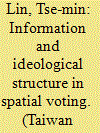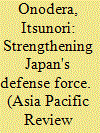| Srl | Item |
| 1 |
ID:
154144


|
|
|
|
|
| Summary/Abstract |
Recent calls to inject substantial doses of deliberation into democratic politics rest on a misdiagnosis of its infirmities. Far from improving political outcomes, deliberation undermines competition over proposed political programs–the lifeblood of healthy democratic politics. Moreover, institutions that are intended to encourage deliberation are all too easily hijacked by people with intense preferences and abundant resources, who can deploy their leverage in deliberative settings to bargain for the outcomes they prefer. Arguments in support of deliberation are, at best, diversions from more serious threats to democracy, notably money's toxic role in politics. A better focus would be on restoring meaningful competition between representatives of two strong political parties over the policies that, if elected, they will implement. I sketch the main outlines of this kind of political competition, differentiating it from less healthy forms of multiparty and intraparty competition that undermine the accountability of governments.
|
|
|
|
|
|
|
|
|
|
|
|
|
|
|
|
| 2 |
ID:
107442


|
|
|
|
|
| Publication |
2011.
|
| Summary/Abstract |
This article aims at unifying the theory of spatial voting and the theory that is
variously called conceptualization, information, or sophistication. Following
Downs's early insights on uncertainty as well as recent developments in both
literatures, I argue that it is of critical importance that spatial voting models
explicitly incorporate information effects. For this purpose, I develop a
heteroskedastic probit model that allows for the specification of information
heterogeneity. This model is applied to the Taiwan Election and Democratization
Study's 2004 post-presidential election survey data. In 2004, Taiwan's political
landscape was dominantly defined by the Green vs. Blue ideological cleavage,
and the candidates were perceived as taking divergent positions. This article
investigates the effects of information and activism on the spatial structure and
their implications on candidates' strategies. My findings confirm the existence
of these effects on voter uncertainty in the framework of spatial analysis.
1
|
|
|
|
|
|
|
|
|
|
|
|
|
|
|
|
| 3 |
ID:
154141


|
|
|
|
|
| Summary/Abstract |
Retrieving an insight dating back to antiquity, this essay argues that the confrontation of opposing views and arguments is desirable in political deliberation. But freedom of speech and diversity among deliberators do not suffice to secure that outcome. Therefore we should actively facilitate and encourage the presentation of contrary opinions during deliberation. Such confrontation is our best means of improving the quality of collective decisions. It also counteracts the pernicious fragmentation of the public sphere. It facilitates the comprehension of choices. Lastly, arguing for and against a given decision treats the minority with respect. This essay proposes practical ways of promoting adversarial deliberation, in particular the organization of debates disconnected from electoral competition.
|
|
|
|
|
|
|
|
|
|
|
|
|
|
|
|
| 4 |
ID:
128254


|
|
|
|
|
| Publication |
2013.
|
| Summary/Abstract |
Inaugurated in December 2012, the second Abe administration embarked upon a number of initiatives, including recovery after the Great East Japan Earthquake and economic revitalization. Japan's defense force is also an area for review and deliberation. To be better prepared to respond to natural disasters as well as to promote cooperation in the Asia-Pacific region, Japan is pursuing strengthened defense force for its national interest in a harmonized manner with regional interests and global security.
|
|
|
|
|
|
|
|
|
|
|
|
|
|
|
|